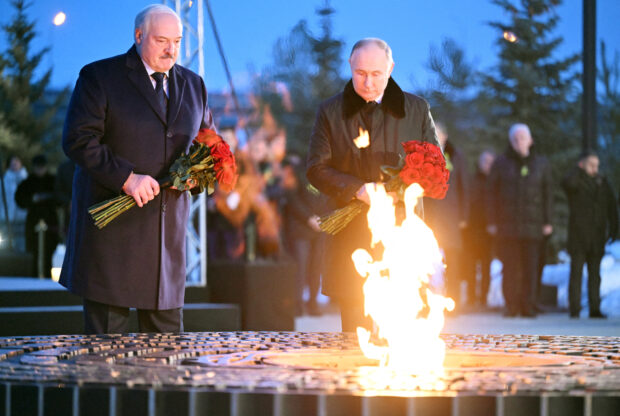
Russian President Vladimir Putin and Belarusian President Alexander Lukashenko lay flowers during a ceremony to unveil the memorial complex to Soviet civilians who were killed during the World War Two, as part of commemorative events marking 80 years since Leningrad siege was lifted, in the village of Zaitsevo in the Leningrad Region, Russia January 27, 2024. Sputnik/Dmitry Azarov/Pool via REUTERS
MOSCOW — Russian President Vladimir Putin castigated Europe on Saturday for “Russophobia” and criticized the Baltic States over human rights at the unveiling of a World War Two memorial.
Since he sent Russian troops into Ukraine nearly two years ago, Putin has been making comparisons with the fight against the Nazis in order to rally his nation.
“The regime in Kyiv exalts Hitler’s accomplices, the SS men … In a number of European countries, Russophobia is promoted as state policy,” Putin said in the Leningrad region for the 80th anniversary of the end of the Nazi siege.
READ: Nazi death camp survivors mark 79th anniversary of Auschwitz liberation
The Germans’ aims then were to steal the Soviet Union’s resources and eliminate its people, he said.
Ukraine, which was part of the Soviet Union and itself suffered devastation at the hands of Hitler’s forces, rejects comparisons as spurious pretexts for a war of conquest.
In his speech, Putin also lambasted the Baltic States over human rights. Estonia, Latvia and Lithuania – ruled from Moscow during the Cold War but now members of the European Union and NATO military alliance – have been among the strongest critics of Russia’s invasion of Ukraine.
“In the Baltic states, tens of thousands of people are declared subhuman, deprived of their most basic rights, and subjected to persecution,” Putin said, referring to migration crackdowns. Moscow has repeatedly accused the Baltic nations of xenophobia and treating Russian minorities as “second-class”.